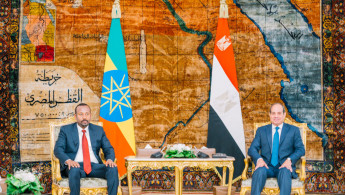Egypt, Sudan and Ethiopia talks in Cairo over controversial GERD dam fail
Egypt, Sudan and Ethiopia have failed to come to an agreement over the contested Grand Ethiopian Renaissance Dam (GERD) on the Nile following two days of talks in Cairo which ended on Monday.
According to the Egyptian Ministry of Water Resources and Irrigation, the failure to agree with Addis Ababa over their controversial Nile dam was due to the lack of a "tangible change in the Ethiopian positions".
The talks were aimed at reaching a legally binding agreement that would give Egypt a say in how the dam is operated and filled.
Downstream states Egypt and Sudan are worried about the effect the GERD will have on their own water supplies with both heavily reliant on the Nile.
Located on the Blue Nile, the GERD has been under construction since 2011 and is nearly complete. Ethiopia began filling the dam in 2020.
Ethiopia hopes the dam will give people greater access to electricity with only 45 percent of the population currently on-grid, according to the International Energy Agency.
However, Egypt worries that the dam will severely reduce the amount of Nile water reaching its territory, causing drought and affecting crop production for its population of over 100 million.
Around 90 percent of Egypt's water comes from the Nile and 85 percent of this from the Blue Nile.
These worries have led Egyptian President Abdel-Fattah al-Sisi to call water security a "red line" for the country.
Despite the failure of the talks, Ethiopia's foreign ministry said: "The parties exchanged views to reach a win-win situation." The next round of talks would be held in Addis Ababa in September, the statement added.
The negotiations come after last month's meeting between Sisi and Ethiopian Prime Minister Abiy Ahmed, who spoke about the dam following a conference on the conflict in Sudan. The two pledged to reach an agreement on the issue within four months.





 Follow the Middle East's top stories in English at The New Arab on Google News
Follow the Middle East's top stories in English at The New Arab on Google News


